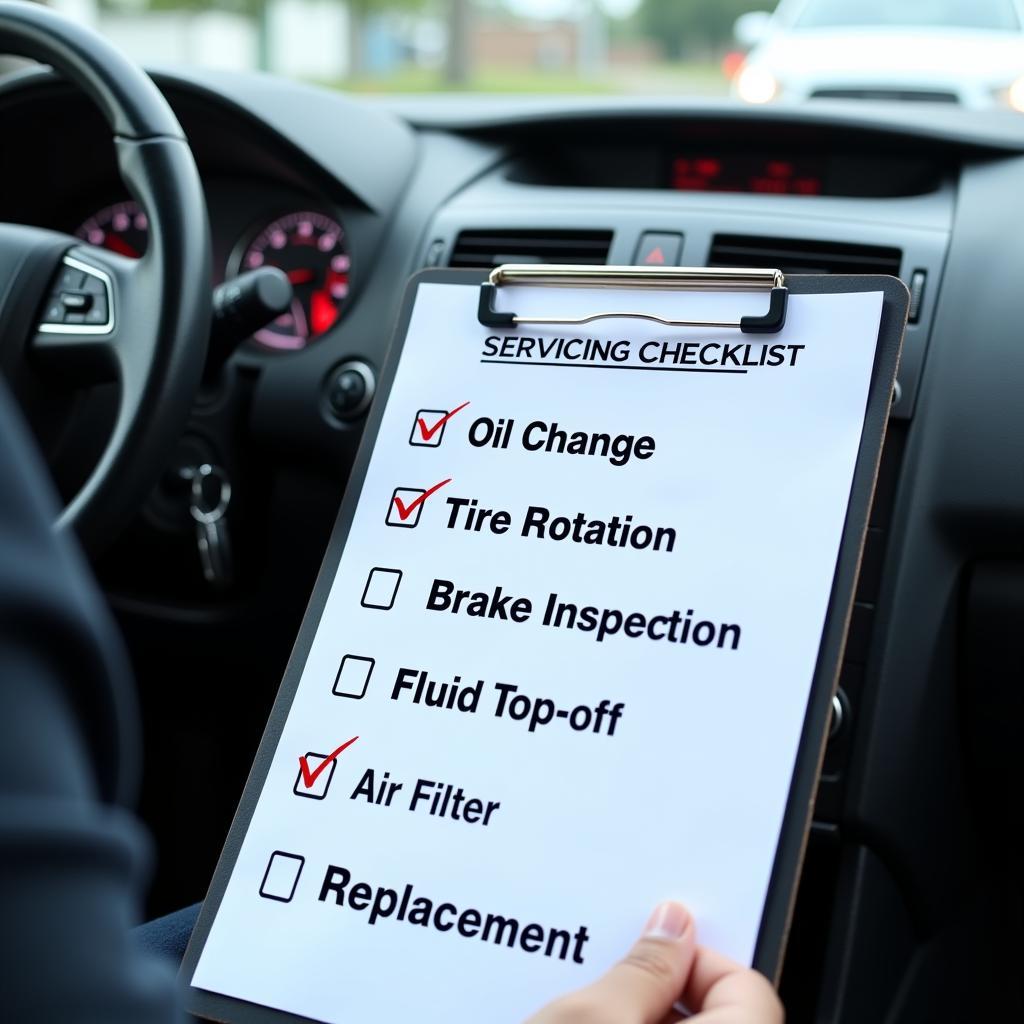What to Do When You Service a Car
Servicing your car regularly is crucial for its longevity, performance, and safety. What To Do When You Service A Car isn’t always clear, though. This guide will provide a comprehensive overview of everything you need to know about car servicing, from understanding what’s involved to finding a trustworthy mechanic.
Understanding Car Servicing Basics
Car servicing involves a series of checks and maintenance procedures performed at regular intervals to keep your vehicle running smoothly. These procedures range from simple inspections to more complex repairs, depending on the service schedule and your car’s specific needs. A regular service can prevent costly repairs down the road. It’s similar to getting regular checkups at the doctor; preventative maintenance is key. Want to know more about car washing services? Check out what do you need for car washing service.
Why is Regular Car Servicing Important?
Regular car servicing is essential for numerous reasons, including:
- Enhanced Safety: Regular checks ensure that critical safety components like brakes, tires, and steering are in optimal condition, minimizing the risk of accidents.
- Improved Performance: A well-maintained car performs better, offering improved fuel efficiency, smoother handling, and a more responsive engine.
- Increased Resale Value: A comprehensive service history demonstrates that a car has been properly cared for, making it more attractive to potential buyers.
- Extended Lifespan: Regular maintenance helps prevent premature wear and tear on your car’s components, extending its lifespan considerably.
 Car Service Checklist
Car Service Checklist
What Happens During a Car Service?
The specific tasks performed during a car service vary depending on the type of service (e.g., interim service, full service, major service) and the manufacturer’s recommendations. However, typical procedures include:
- Oil and Filter Change: Replacing the engine oil and filter is a fundamental part of most services, ensuring proper lubrication and preventing engine damage.
- Fluid Top-Ups: Checking and topping up essential fluids like coolant, brake fluid, power steering fluid, and windshield washer fluid.
- Brake Inspection: Examining the brake pads, discs, and lines for wear and tear and making necessary adjustments or replacements.
- Tire Rotation and Pressure Check: Rotating tires ensures even wear and tear, while maintaining correct tire pressure improves fuel efficiency and handling.
- Air Filter Replacement: A clean air filter allows for optimal airflow to the engine, improving performance and fuel economy.
- Spark Plug Replacement: Worn-out spark plugs can lead to reduced fuel efficiency and engine misfires. They are typically replaced at specific intervals.
- Battery Check: Assessing the battery’s health and ensuring it’s holding a proper charge.
Are you required to get the 30k service for your car? Find out more about do you have to get 30k service on car.
Finding a Trustworthy Mechanic
Choosing a reputable mechanic is vital for ensuring your car receives quality service. Here are some tips:
- Ask for Recommendations: Seek recommendations from friends, family, and colleagues.
- Read Online Reviews: Check online platforms like Yelp and Google Reviews for feedback from other customers.
- Look for Certifications: ASE-certified mechanics have demonstrated a high level of competence and professionalism.
- Get Multiple Quotes: Comparing quotes from different mechanics can help you find a fair price. Be wary of unusually low prices, as they may indicate subpar service. Wondering if dealerships offer car washes during servicing? Learn more by checking does your car get washed at a service.
What Questions Should I Ask a Mechanic?
When talking to a potential mechanic, ask questions like:
- “What type of services do you specialize in?”
- “Do you provide written estimates?”
- “What warranties do you offer on your work?”
- “Do you use original equipment manufacturer (OEM) parts?”
“A thorough car service is an investment in your vehicle’s long-term health and your peace of mind,” says John Miller, a certified automotive technician with over 20 years of experience. “Regular maintenance is always more cost-effective than dealing with major repairs later on.” It’s also essential to understand the costs associated with car services. Many people wonder, do you tip when car is in for service?
Conclusion
Knowing what to do when you service a car empowers you to maintain your vehicle effectively. By following the tips outlined in this guide, you can ensure your car remains safe, reliable, and performs at its best for years to come. Regular car servicing is not just an expense; it’s an investment in your safety and the longevity of your vehicle. Ignoring regular maintenance can lead to more significant problems and higher costs down the line.
FAQ
- How often should I service my car?
- What is the difference between an interim service and a full service?
- How much does a car service typically cost?
- What are the signs that my car needs servicing?
- Can I service my car myself?
- How do I choose the right type of oil for my car?
- What should I do if my car breaks down between services?
Need assistance with car diagnostics or repairs? Contact us via WhatsApp: +1(641)206-8880, Email: cardiagtechworkshop@gmail.com or visit our workshop at 456 Oak Avenue, Miami, FL 33101, USA. Our customer service team is available 24/7.

